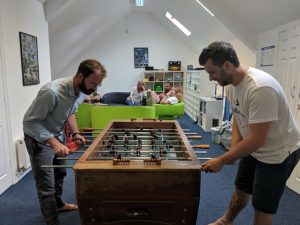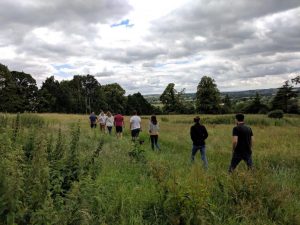You Must be Mental to be an Ecologist – By Jim Phillips
BLOG
 You have probably all read this headline and made an instant assumption about its meaning. Is that because of the way the word mental is used in society? Following on from CIEEM’s successful summer conference, ‘Health and Wellbeing in the Ecology and Environmental Management Profession’, the use of the word ‘mental’ was well articulated and debated. For me it was summed up brilliantly by Geoff McDonald, the mental health campaigner who was given the enviable post-lunch slot, who asked, “Are we all physical?” – “Yes” was the answer from the delegates. But when Geoff then asked, “Who’s mental?”, there was a notable silence.
You have probably all read this headline and made an instant assumption about its meaning. Is that because of the way the word mental is used in society? Following on from CIEEM’s successful summer conference, ‘Health and Wellbeing in the Ecology and Environmental Management Profession’, the use of the word ‘mental’ was well articulated and debated. For me it was summed up brilliantly by Geoff McDonald, the mental health campaigner who was given the enviable post-lunch slot, who asked, “Are we all physical?” – “Yes” was the answer from the delegates. But when Geoff then asked, “Who’s mental?”, there was a notable silence.
I took from this the notion that whilst we all understand the physical being and the use of this term, we shy away from this term ‘mental’. Other speakers at the conference furthered this debate and included one particularly astonishing fact: over 95% of expenditure on ‘health and safety’ in the UK (which was billions!) was related to physical health. So does that mean mental health accounts for only 5% of the issues? It was clear from the conference that, in our sector at least, this is far from the case. As the conference continued and delegates took the opportunity to debate the issues at hand, I had several conversations with colleagues about some of the ideas we have put into place at my company, Ethos Environmental Planning. As one of the sponsors of the conference, I set out a board with ‘things we do at Ethos to help health and mental wellbeing’, as summarised below:
- Office dog. Benefits of an office dog include lower blood pressure, reduced headaches and tiredness and increased productivity. Dogs might not be trained to detect great crested newts,
 but have an important role reducing stress in the office!
but have an important role reducing stress in the office! - Flexible working hours. There’s more to life than work and we try to strike the right balance between work and play, even during the busiest months. We have a limit of no more than two evening surveys a week, so staff are not burned out and flexible working hours mean that we can take time off during the week, or even save them up for longer holidays.
- Work ‘jollies’. Our annual Christmas trip to Portugal is a chance to celebrate the end of a busy survey season. During long summer days it is something that we all look forward to and it is an important moral boost for the team. We organise regular trips away throughout the year as well – combining some relaxed in-house training with beach walks, BBQs and prosecco in the hot tub!
- Lunch time walks. The Ethos head office is located in beautiful countryside between Bath and Bristol. With a network of footpaths on our doorstep, we can explore meadows and woodland on our daily lunchtime walk. Not only is this a chance to practise some field ID, but the benefits of fresh air, exercise and the sights and sounds of nature have a great impact on our mental well-being.
- Table football. There’s nothing like a high-stakes table football match to distract you from outstanding emails and reports. Our designated break room means we can completely get away from our desks and relax.
- Office slippers. As well as the practicalities of keeping muddy ecology boots off the carpet, wearing slippers in the office has been linked to reduced work-place stress and increased productivity.
 It was pleasing to hear that many of the things we do at Ethos are also taking place in other consultancies, but I also got the impression that there are many doing very little and may have a long way to go. I hope the ideas and debate generated from the conference help those who are at the start of their mental journey to progress matters, and for those of us who have made a start already, to continue to grow and improve. To this note, having fed back discussions and ideas with my own team at Ethos, we have ourselves pledged to implement a number of further measures related to mental health and wellbeing:
It was pleasing to hear that many of the things we do at Ethos are also taking place in other consultancies, but I also got the impression that there are many doing very little and may have a long way to go. I hope the ideas and debate generated from the conference help those who are at the start of their mental journey to progress matters, and for those of us who have made a start already, to continue to grow and improve. To this note, having fed back discussions and ideas with my own team at Ethos, we have ourselves pledged to implement a number of further measures related to mental health and wellbeing:
- Putting mental wellbeing on the agenda for all our management team meeting
- Having mental wellbeing as an item to discuss on all colleagues’ review meetings
- Adding a poster on mental wellbeing to our health and safety notice board
- Having a mental health first aider at the office
- Removing 90% of lone working from site visits (i.e. ensuring there is always more than one person doing surveys).
It was concluded at the conference that the issues raised and ideas shared were ‘just a start’ and I hope as the debate does continue, new ideas are shared and we can add to the list above to ensure that we are indeed all mental.
Jim Phillips BSc (Hons) MA MCIEEM
www.ethosep.co.uk
Blog posts on the CIEEM website are the views and opinions of the author(s) credited. They do not necessarily represent the views or position of CIEEM. The CIEEM blog is intended to be a space in which we publish though-provoking and discussion-stimulating articles.

 but have an important role reducing stress in the office!
but have an important role reducing stress in the office!